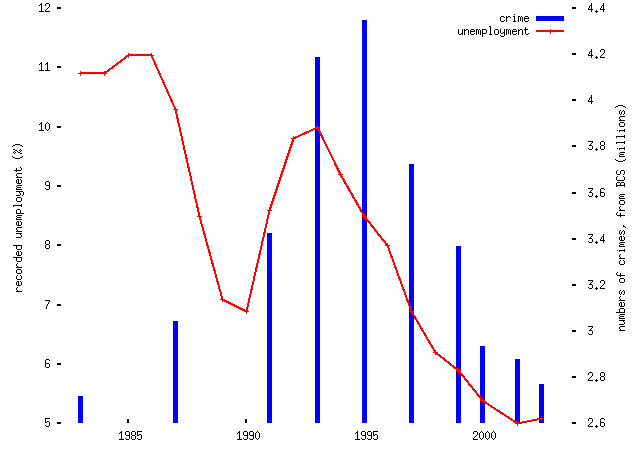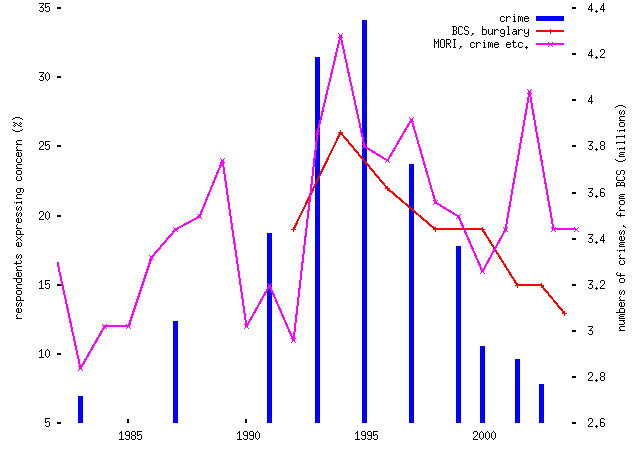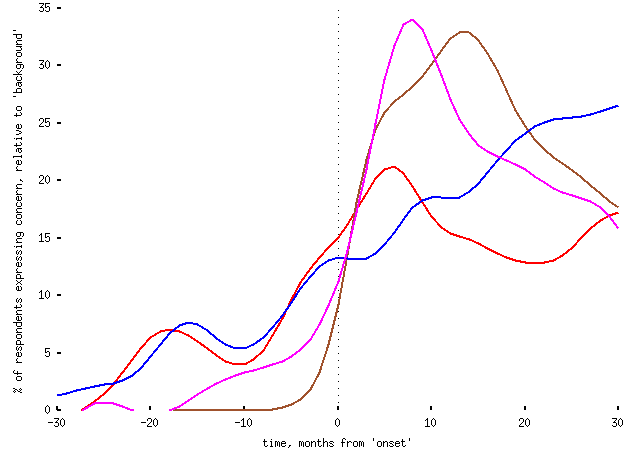Just a brief comment on the crime figures. I'm willing to bet that, as long as both reported crime numbers from the police and data from the British Crime Survey have both been published (since 1982, I think) the government have pointed to the lower of the two and the opposition to the higher. This may be sound politics but it is intellectually dishonest. That not all crime is reported to the police is a fairly obvious point which opposition politicians presumably do understand (and will themselves point out if they ever form a government...). To claim, as David Davis does, that,
The most reliable measure of crime is that which is reported to the police.
Crime is falling but the number of crimes reported to the police is rising. This combination isn't even necessarily surprising: people are more likely to report crime if they think that doing so will achieve something useful so you'd expect the fraction of crimes reported to the police to rise as crime falls.
Elsewhere it has been pointed out that crime has been falling just as unemployment has been falling. This has been true since the early 1990s, certainly: (NB that crime figures in this plot excludes Scotland and Northern Ireland, while unemployment figures are for the whole UK, so it should be taken as a general indication of the trend only)
but not really before then. This doesn't tell us anything about causation, but the implicit theory -- that people who can't find jobs go a-burgling instead -- seems fairly plausible. New Labour may have created 661 new offences and all sorts of new schemes for stopping crime since coming to office, but chances are the fall in crime is just the result of an improving economy.
Elsewhere in the BCS it is reported that two thirds of the population believe that crime is rising; half of them believe that it's risen `a lot' in the past year. Probably they always say that, but fewer do so this year than last, when the figures were 78% and 38% in the previous survey. Since 1992, fear of crime (rather than perception of its incidence) has actually been falling as crime falls, but in MORI's polls of the most important issues facing Britain today, the numbers expressing concern about crime, law and order, violence and vandalism are only poorly correlated with the actual crime rate:
(I've plotted fear of burglary specifically, as this has been reported by the BCS for longer than fear of other crimes.) Of course, the people expressing concern in MORI's survey are expressing concern about all crime and violence (and other sorts of antisocial behaviour too); even so, the figures for fear of car crime and violent crime in the BCS have also fallen during the few years they've been recorded, and don't reflect the recent peak in concern from MORI's polls. I'm (cynically) convinced that people's view of `the most important issues' facing the country is completely dominated by media coverage of those issues. As a little bit of evidence tangential to the point, try to guess which issue is which in this plot, also from the MORI data:
(Those who've seen that plot before: let the others have a go. The issues I've plotted concern about are,
- nuclear weapons (in the early '80s);
- the European Union (early '90s);
- the NHS (late '90s);
- immigration (early '00s).
The answer is here, but trying to guess is probably more fun.)


